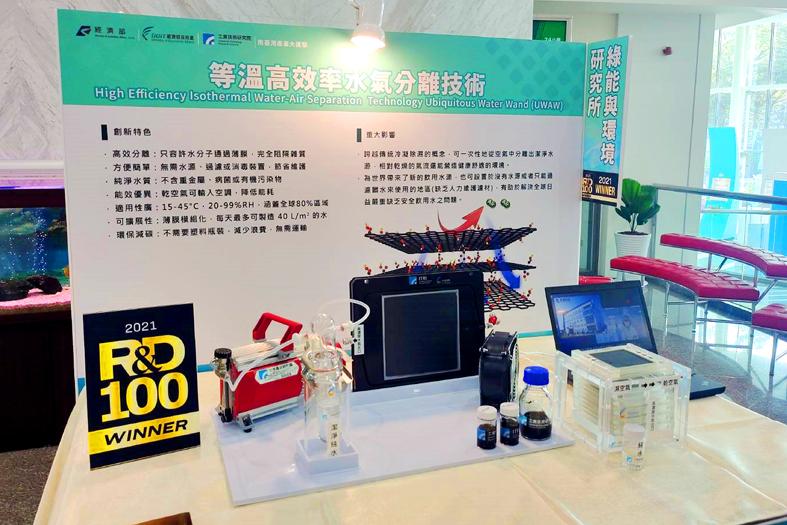The Industrial Technology Research Institute (ITRI) on Wednesday unveiled a graphite membrane-based technology that can draw water from the air.
The technology was recognized this year at the US-based R&D 100 Awards, the institute told a news conference at an innovation forum at its Southern Region Campus in Tainan’s Lioujia District (六甲).
The graphite oxide membrane is housed in a “ubiquitous water wand,” which collects water vapor from the air and condensed water from it, potentially helping people in arid climates, the institute said.

Photo: CNA
Scientists are exploring possibilities to make use of the material on a large scale, which could provide a technological response to water scarcity, it said.
Other inventions highlighted at the forum included a miniaturized 3D sensing module that enables robots to grab objects with precision and a kilowatt-class fuel cell technology that boosts the efficiency of hydrogen batteries, it said.
Institute senior vice president Wu Cheng-wen (吳誠文), who is director-general of the southern campus, said that the semi-public foundation is working with the government to upgrade industry in southern Taiwan.
The institute has collaborated with nearly 4,500 enterprises to integrate the technological research and innovation resources of the private sector, academia and the government, Wu said.
Tainan Deputy Mayor Chao Ching-hui (趙卿惠) said that the city has established complete industry value chains that are to be augmented by other projects, including the Shalun Green Energy Technology Demonstration Site and expansions to the Tainan Technology Industrial Park.
The ITRI is a valued partner in the city government’s efforts to promote economic growth via investments in technology and renewable energy, Chao said.

A magnitude 4.9 earthquake struck off Tainan at 11:47am today, the Central Weather Administration (CWA) said. The hypocenter was 32.3km northeast of Tainan City Hall at a depth of 7.3km, CWA data showed. The intensity of the quake, which gauges the actual effect of a seismic event, measured 4 in Tainan and Chiayi County on Taiwan's seven-tier intensity scale, the data showed. The quake had an intensity of 3 in Chiayi City and County, and Yunlin County, while it was measured as 2 in Kaohsiung, Nantou County, Changhua County, Taitung County and offshore Penghu County, the data showed. There were no immediate reports of

Weather conditions across Taiwan are expected to remain stable today, but cloudy to rainy skies are expected from tomorrow onward due to increasing moisture in the atmosphere, according to the Central Weather Administration (CWA). Daytime highs today are expected to hit 25-27°C in western Taiwan and 22-24°C in the eastern counties of Yilan, Hualien, and Taitung, data on the CWA website indicated. After sunset, temperatures could drop to 16-17°C in most parts of Taiwan. For tomorrow, precipitation is likely in northern Taiwan as a cloud system moves in from China. Daytime temperatures are expected to hover around 25°C, the CWA said. Starting Monday, areas

Taiwan has recorded its first fatal case of Coxsackie B5 enterovirus in 10 years after a one-year-old boy from southern Taiwan died from complications early last month, the Centers for Disease Control (CDC) said yesterday. CDC spokesman Lo Yi-chun (羅一鈞) told a news conference that the child initially developed a fever and respiratory symptoms before experiencing seizures and loss of consciousness. The boy was diagnosed with acute encephalitis and admitted to intensive care, but his condition deteriorated rapidly, and he passed away on the sixth day of illness, Lo said. This also marks Taiwan’s third enterovirus-related death this year and the first severe

A Taiwanese software developer has created a generative artificial intelligence (AI) model to help people use AI without exposing sensitive data, project head Huang Chung-hsiao (黃崇校) said yesterday. Huang, a 55-year-old coder leading a US-based team, said that concerns over data privacy and security in popular generative AIs such as ChatGPT and DeepSeek motivated him to develop a personal AI assistant named “Mei.” One of the biggest security flaws with cloud-based algorithms is that users are required to hand over personal information to access the service, giving developers the opportunity to mine user data, he said. For this reason, many government agencies and